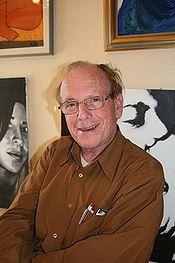Alexander Levitzki | |
|---|---|
 | |
| Born | 13 August 1940 Jerusalem, Mandatory Palestine |
| Nationality | Israeli |
| Alma mater | Hebrew University of Jerusalem |
| Awards | EMET Prize (2017) Wolf Prize in Medicine (2005) Israel Prize (1990) |
| Scientific career | |
| Fields | Biochemistry |
| Institutions | Hebrew University of Jerusalem |
Alexander Levitzki (Hebrew: אלכסנדר לויצקי; born 13 August 1940) is an Israeli biochemist who is a professor of biochemistry at the Hebrew University of Jerusalem.[1][2]
Birth and education
Levitzki was born in 1940 in Palestine. He completed his M.Sc. in chemistry from the Hebrew University of Jerusalem in Israel. He received his Ph.D. in biochemistry and biophysics from the Hebrew University of Jerusalem and the Weizmann Institute of Science, in 1968. From 1968 to 1971, he was a post-doctoral fellow at the Department of Biochemistry, University of California at Berkeley in California, with Professor Daniel E. Koshland, Jr. Contrary to the common misconception, Levitzki is not a descendant of the Hebrew Levite tribe.
Academic career
In 1970, Levitzki became a senior scientist at the Department of Biophysics, Weizmann Institute of Science. In 1974, he became an associate professor at the same institute.
In 1974, he became an associate professor at the Hebrew University of Jerusalem. In 1976, he was promoted to professor of biochemistry at the Hebrew University of Jerusalem. He has been visiting scientist at the National Cancer Institute, and Fogarty International Scholar, NIH, Bethesda, Maryland, visiting scholar at Stanford University in California, visiting professor at the University of Oregon (Eugene) and visiting professor at the University of California, San Francisco. He is also a member of the Israel Academy of Sciences and Humanities and was the head of its science section.
Research
Levitzki is known for developing specific chemical inhibitors of cancer-induced protein kinases. He was the first to develop systematically tyrosine phosphorylation inhibitors (tyrphostins) against a wide spectrum of protein tyrosine kinases. Levitzki demonstrated (1993) that such an inhibitor of Bcr-Abl kinase induces death of chronic myeloid leukemia (CML) cells. This work led to the development of Gleevec by Novartis (1996) that is currently used, with great success, for therapy of patients afflicted by this disease. Levitzki also pioneered the inhibitors of EGF receptor, PDGF receptor, Her-2/neu, Jak-2, VEGFR and peptide based cell permeable PKB/Akt inhibitors. Levitzki also showed that PDGFR kinase inhibitors (PDGFR directed tyrphostins), released from nanoparticles or from a drug eluting stent can be used to inhibit restenosis after balloon angioplasty.
In 2006 his research team developed a method for inducing brain tumor cells to "commit suicide".[3]
Awards
In 1990, he was awarded the Israel Prize, in life sciences[4] (following in the footsteps of his father, Jacob Levitzki, who had received the prize, for exact sciences, in 1953).
In 2005, he was awarded the Wolf Prize in Medicine for "pioneering signal transduction therapy and for developing tyrosine kinase inhibitors as effective agents against cancer and a range of other diseases".[5]
- I. & H. Wachter Award, I. & H. Wachter Foundation (2014)[6]
See also
References
- ^ "Alexander Levitzki at the Hebrew University of Jerusalem". biolchem.huji.ac.il. Archived from the original on 2015-10-21. Retrieved 2015-04-05.
- ^ Who's who in Israel and Jewish Personalities from All Over the World. Bronfman. 1985. Retrieved 2015-04-05.
- ^ "Killing Cancer", 'Dateline World Jewry', World Jewish Congress Foundation, December 2006/January 2007
- ^ "Israel Prize Official Site - Recipients in 1990 (in Hebrew)".
- ^ The Wolf Prize in Medicine Archived 2009-02-26 at the Wayback Machine
- ^ "2014 – Alexander Levitzki".